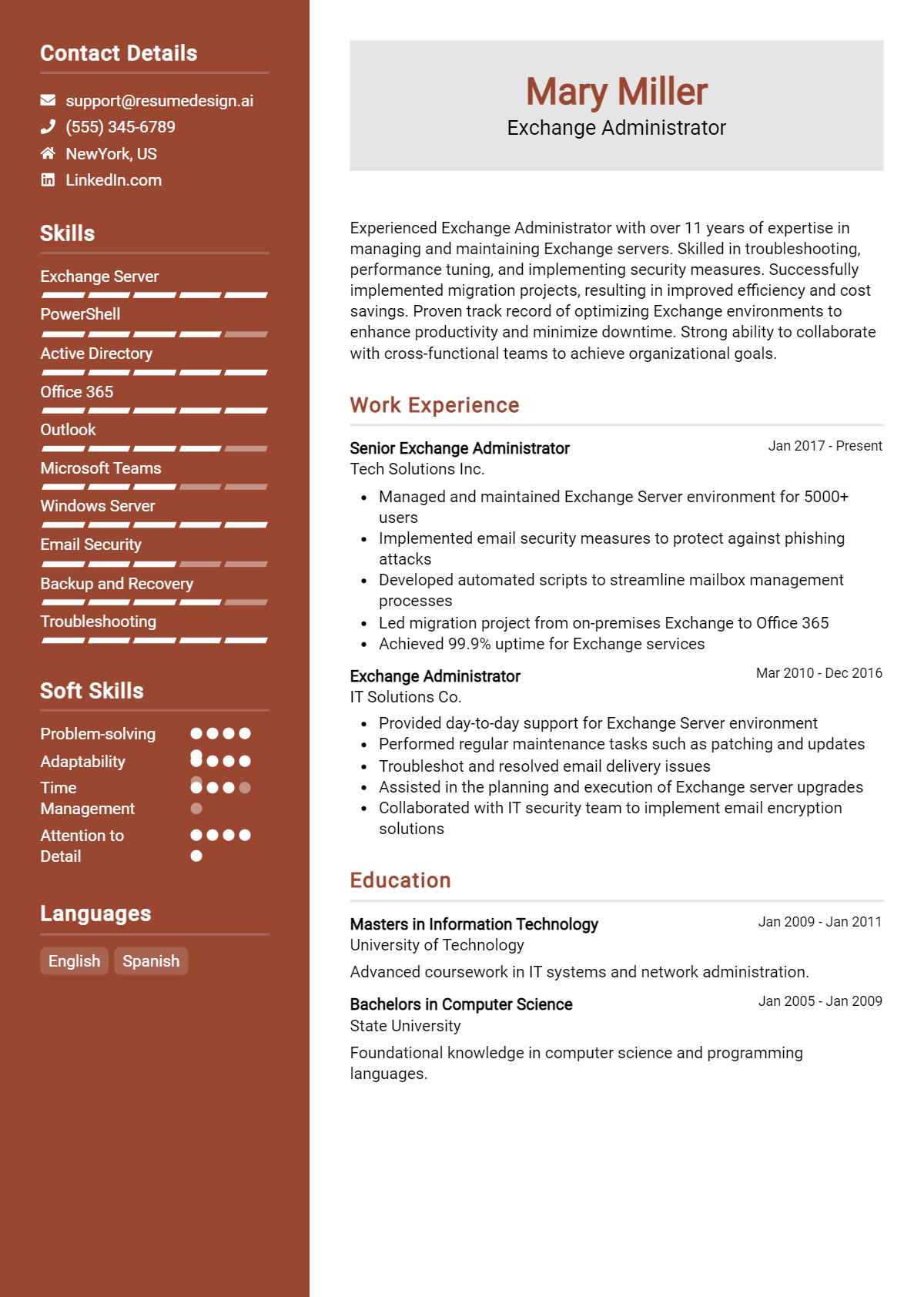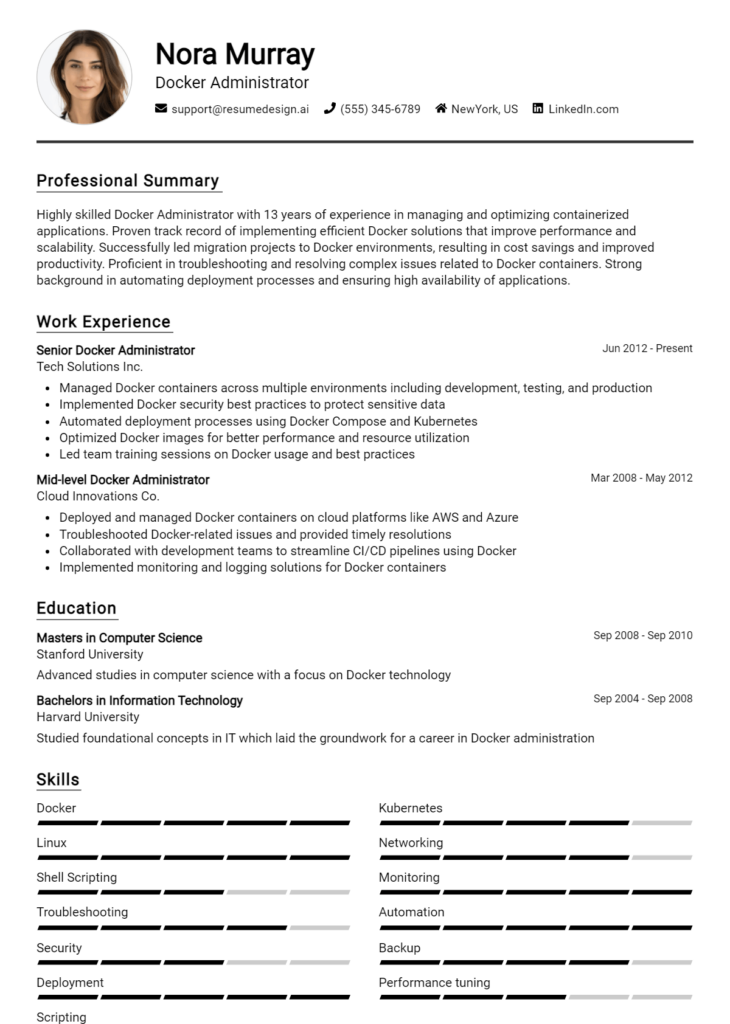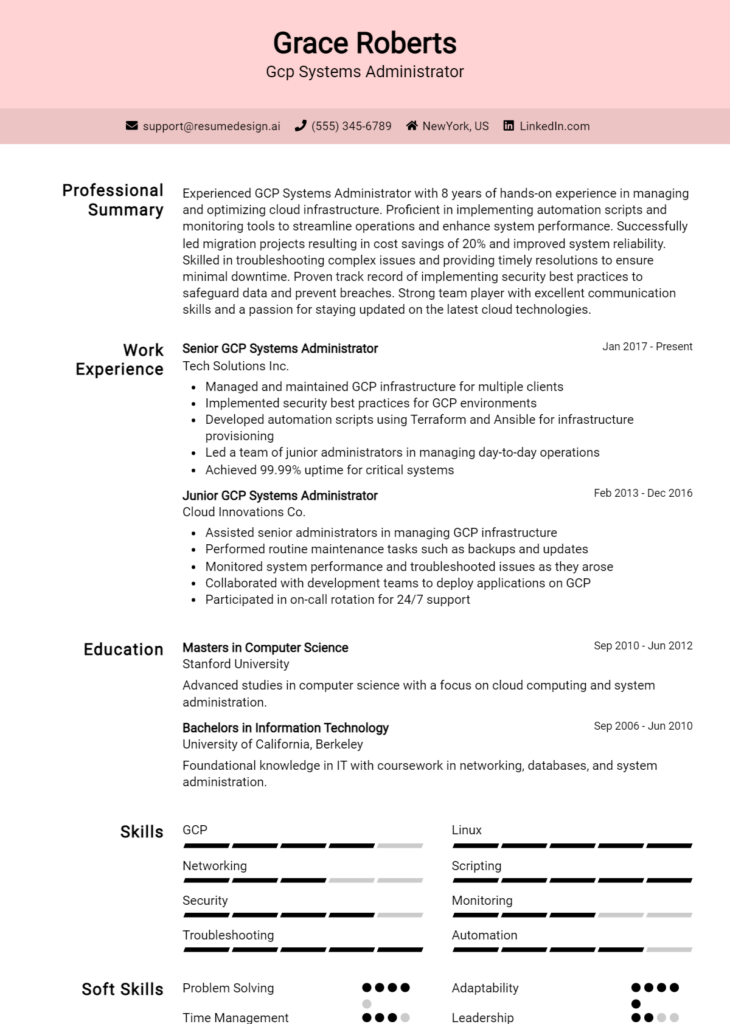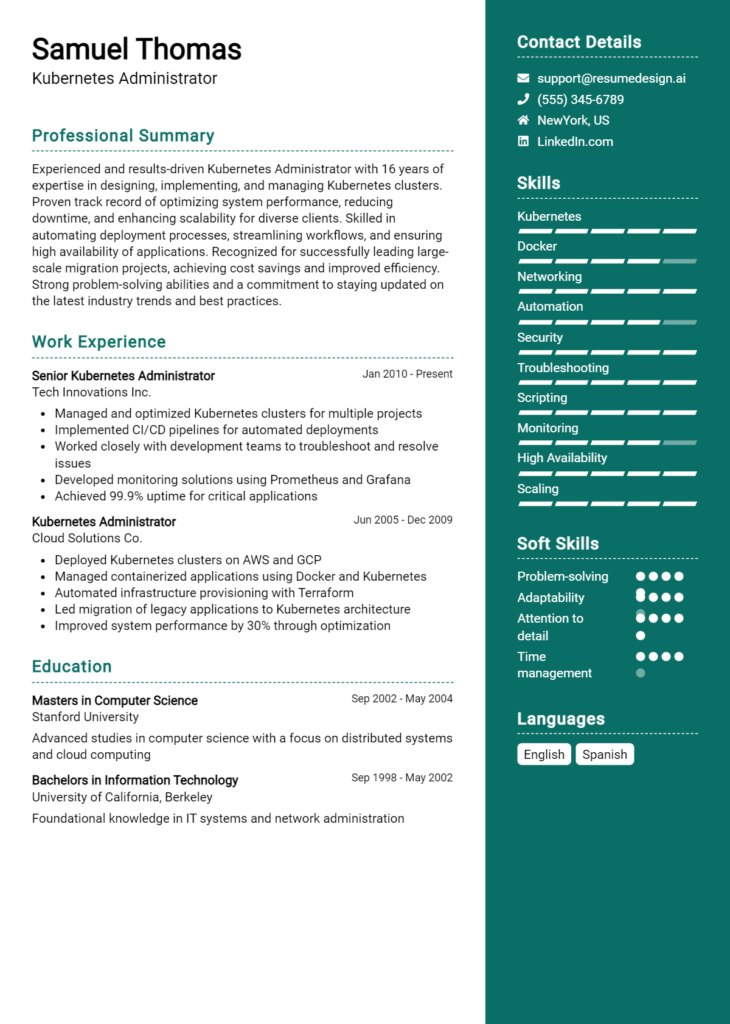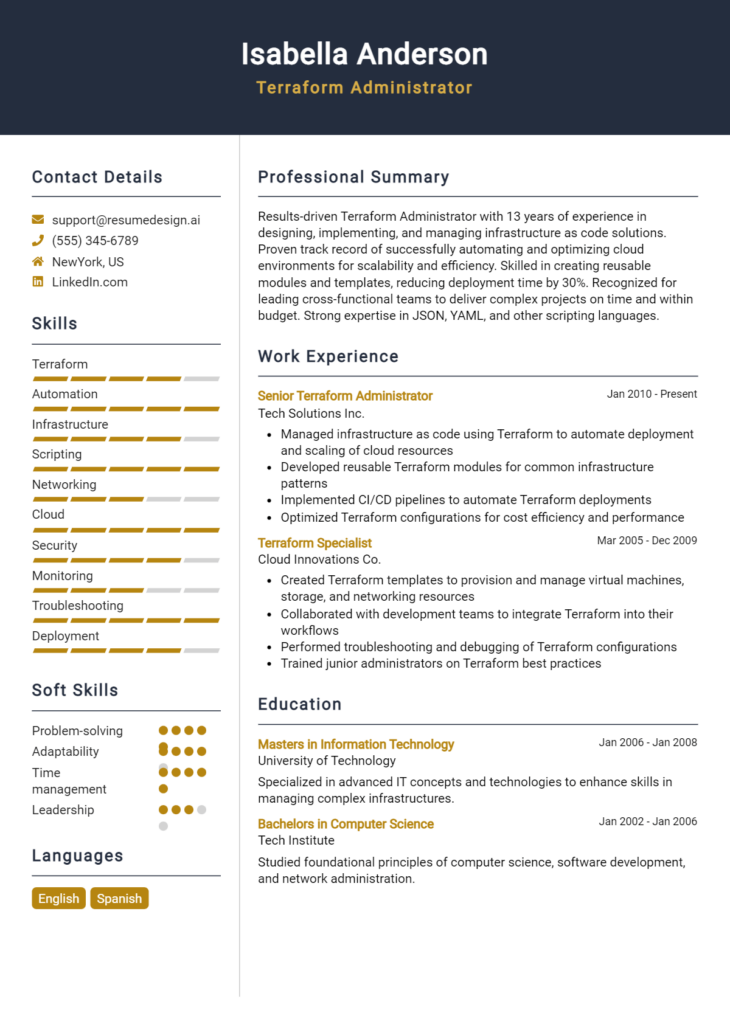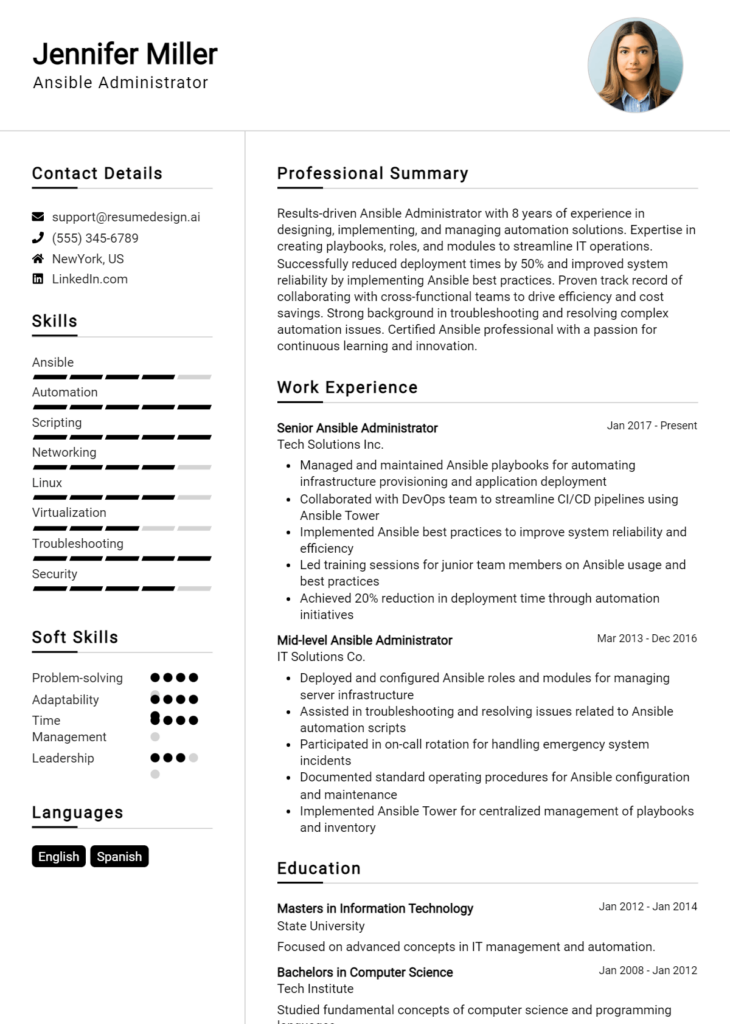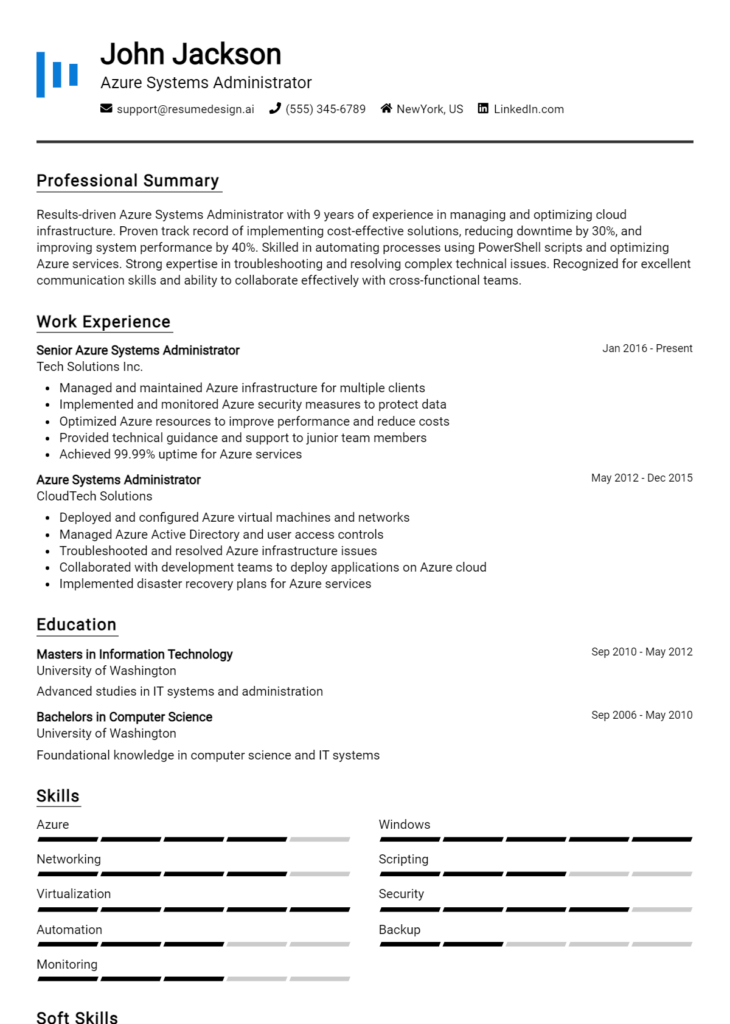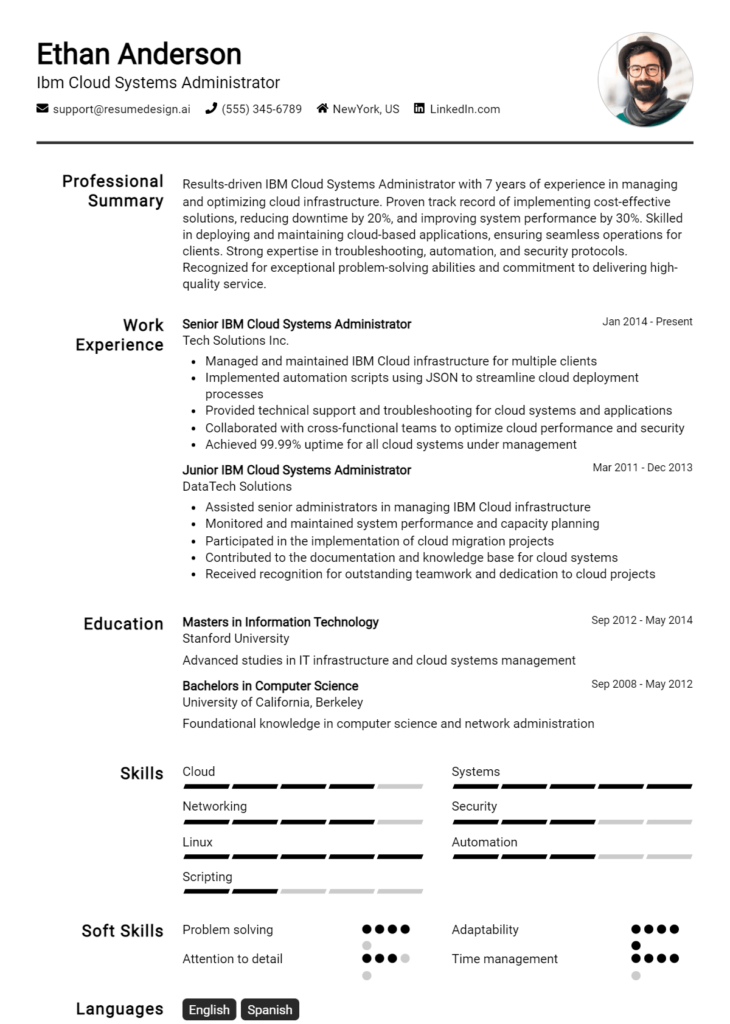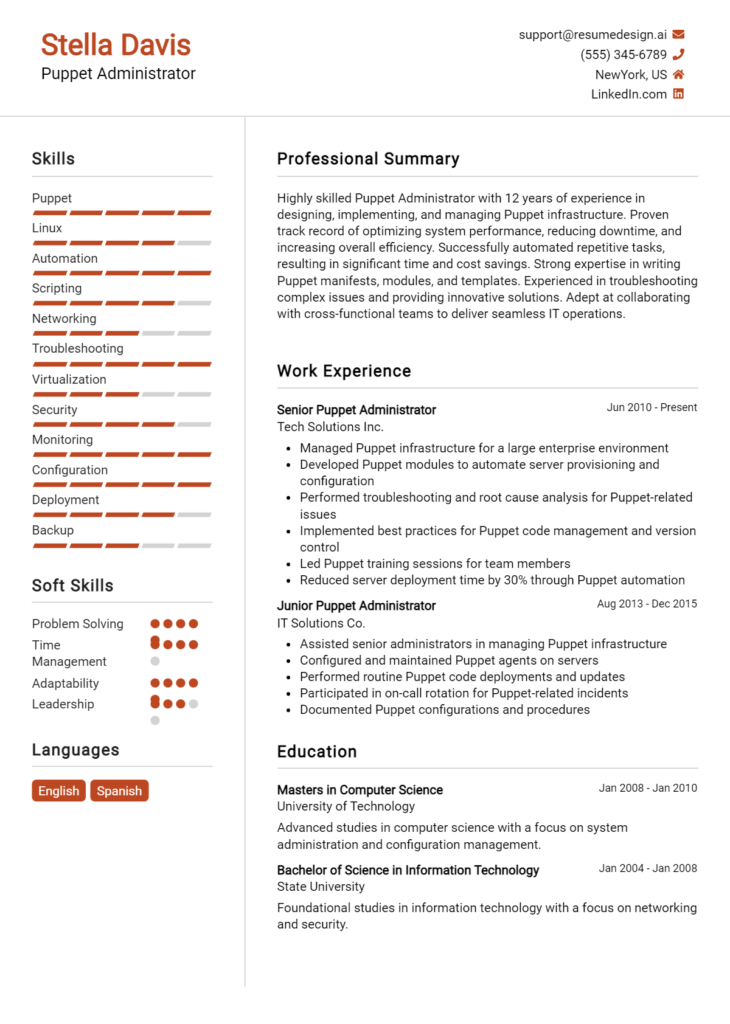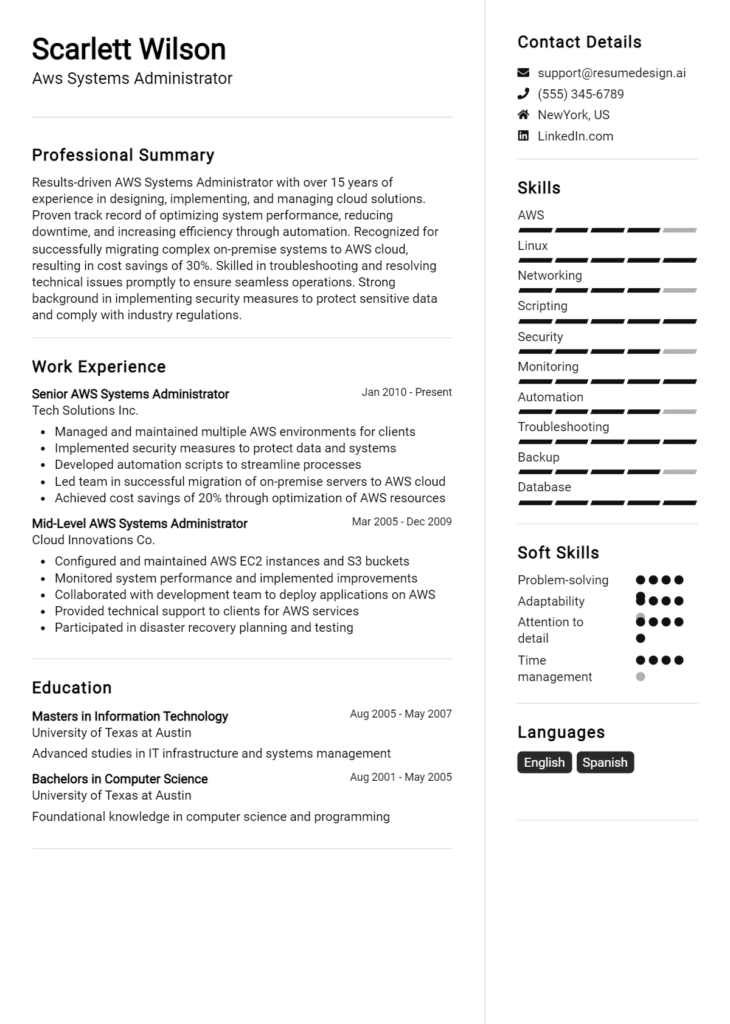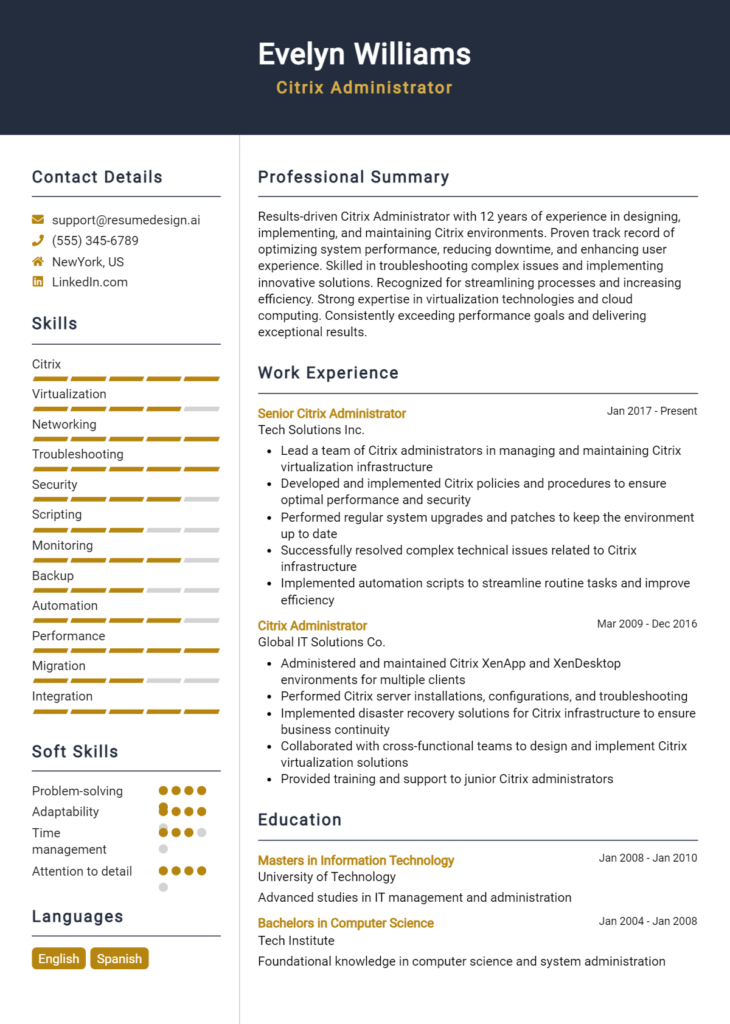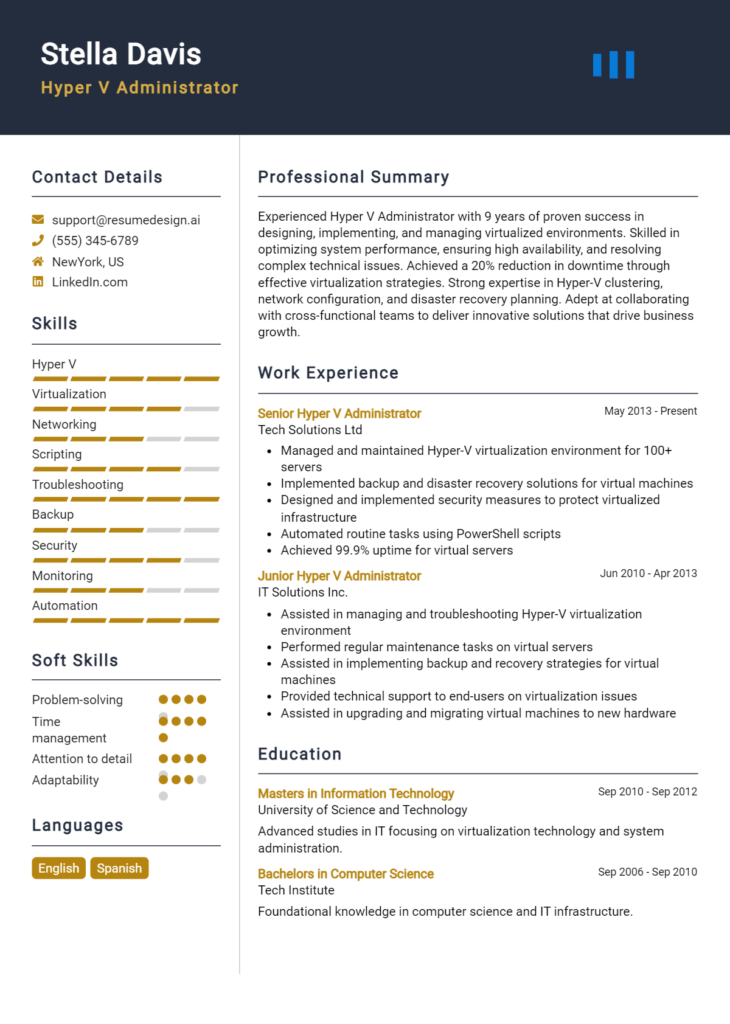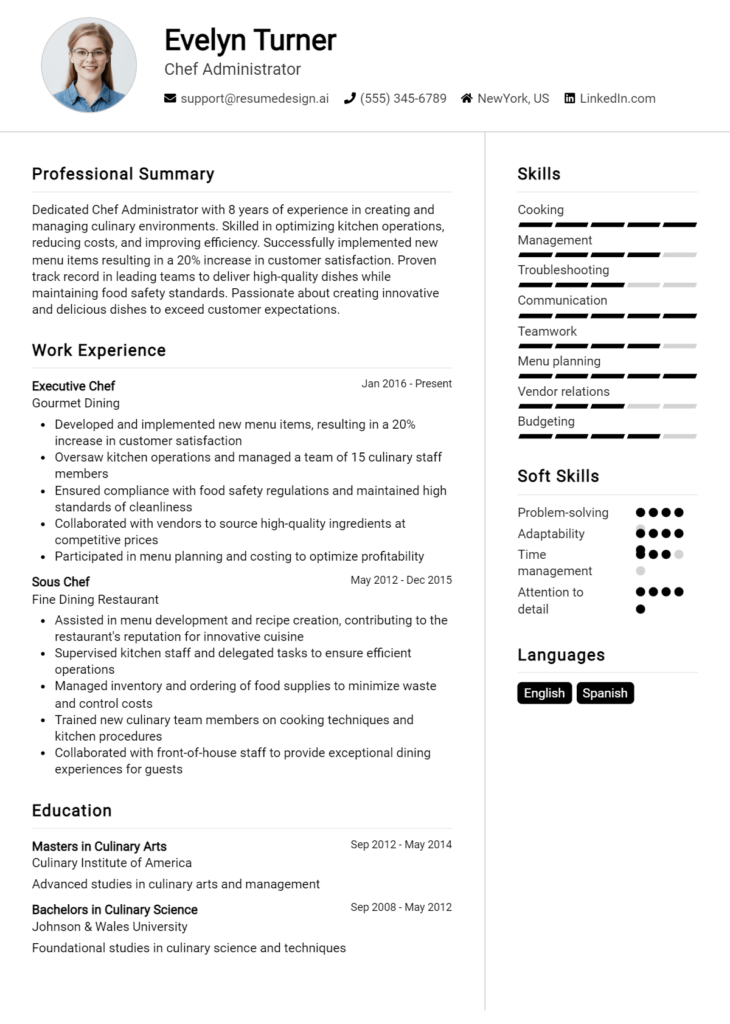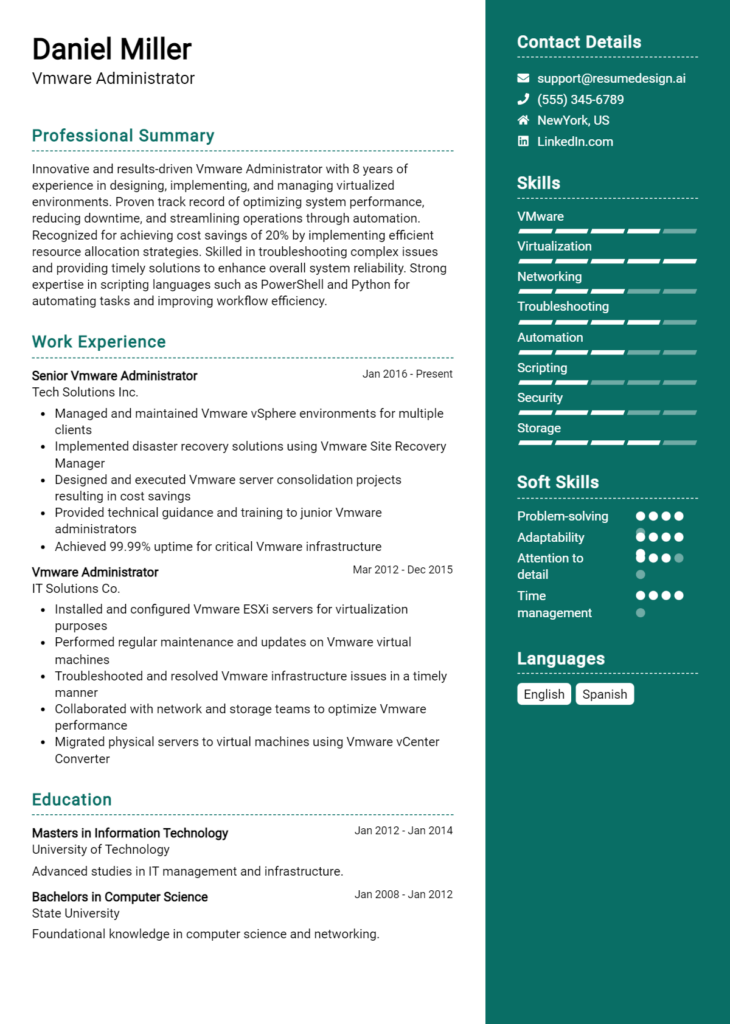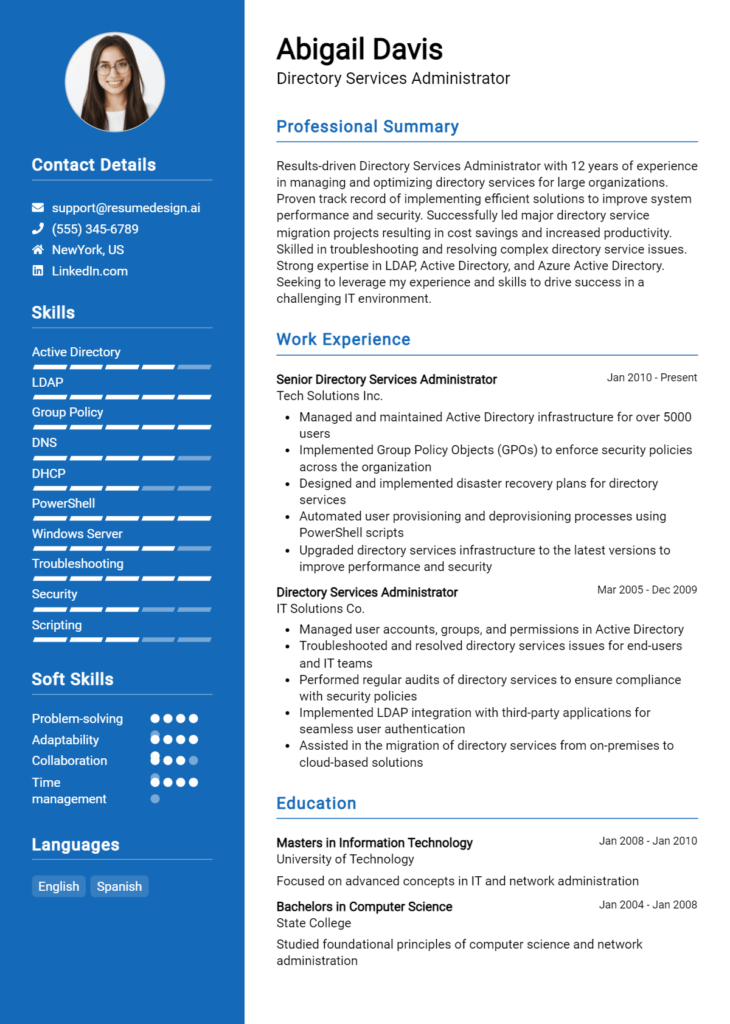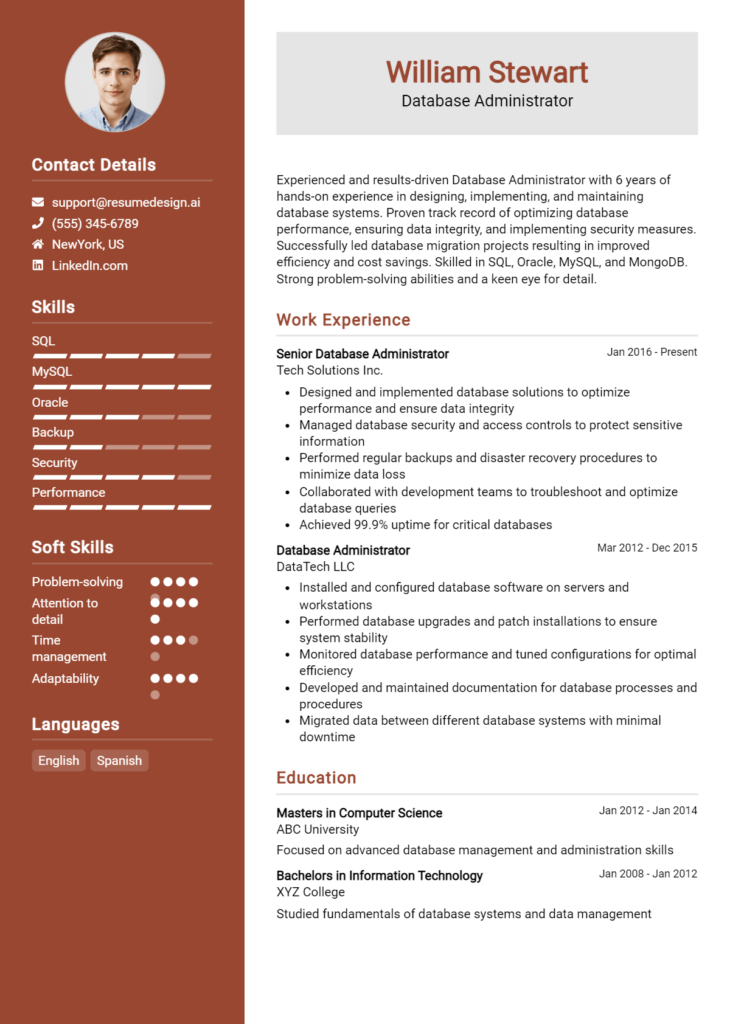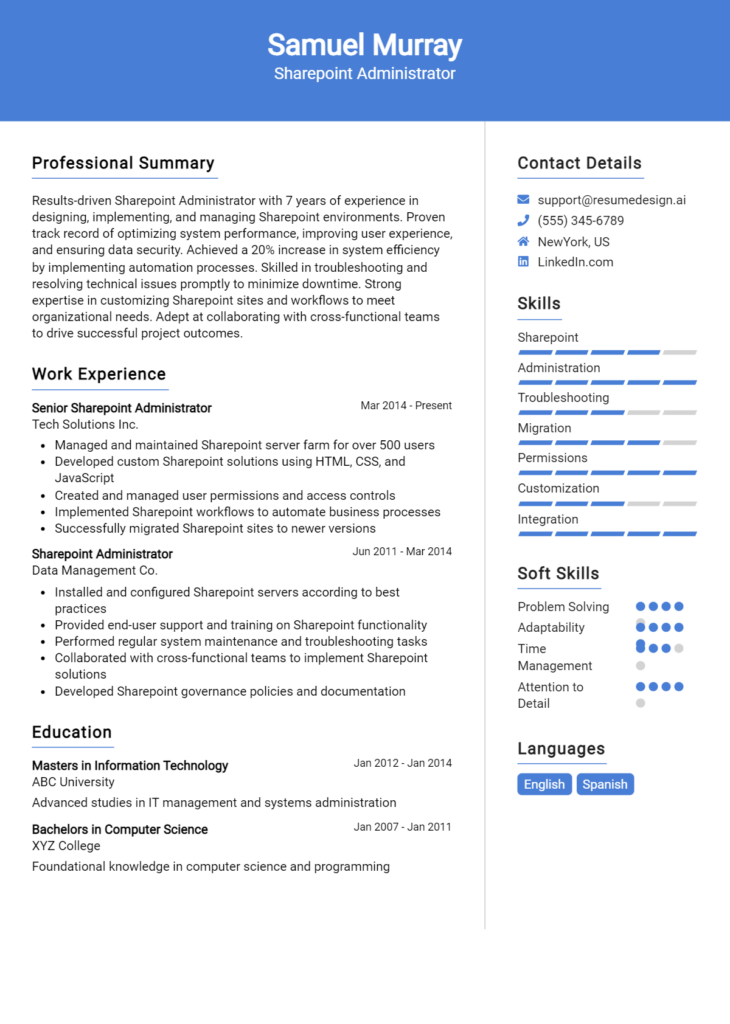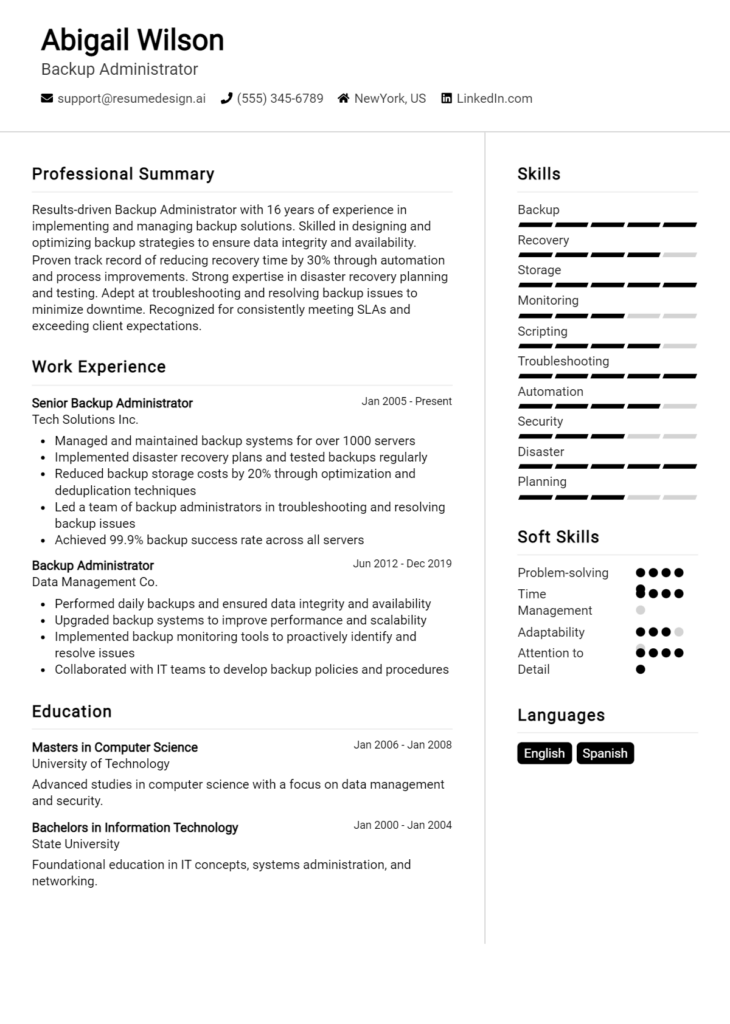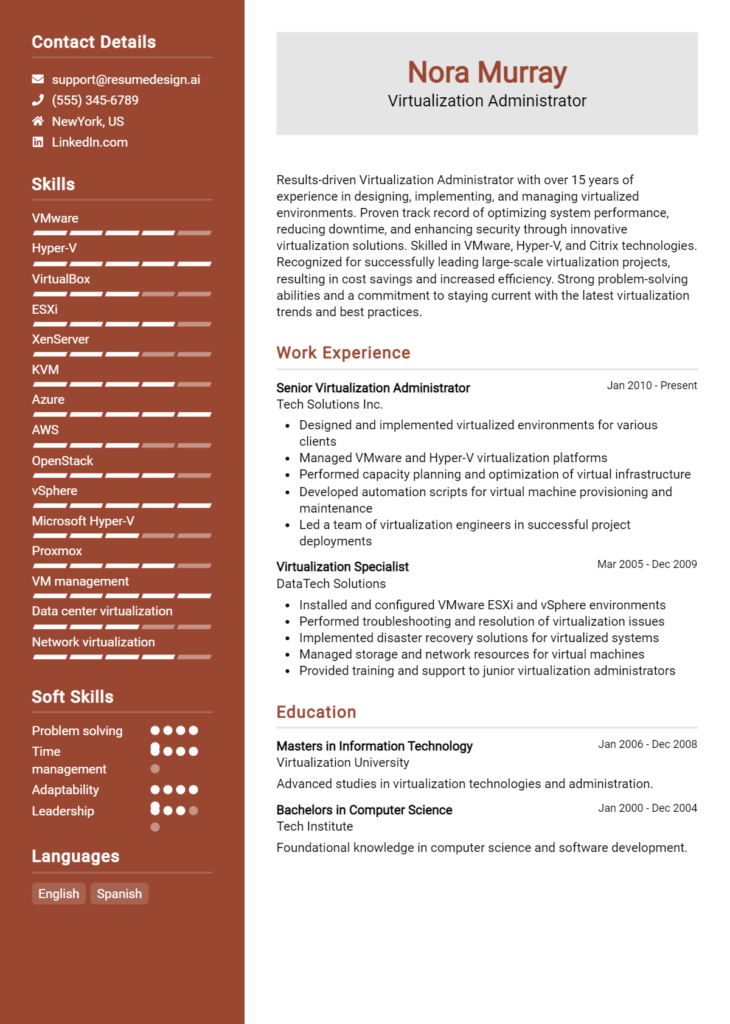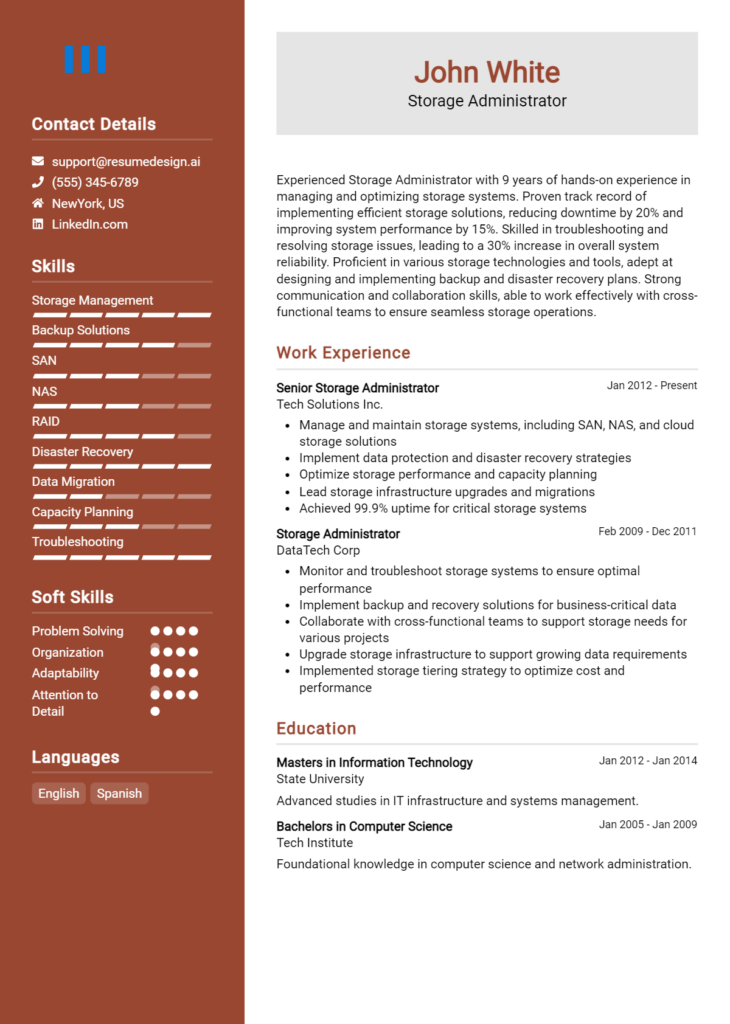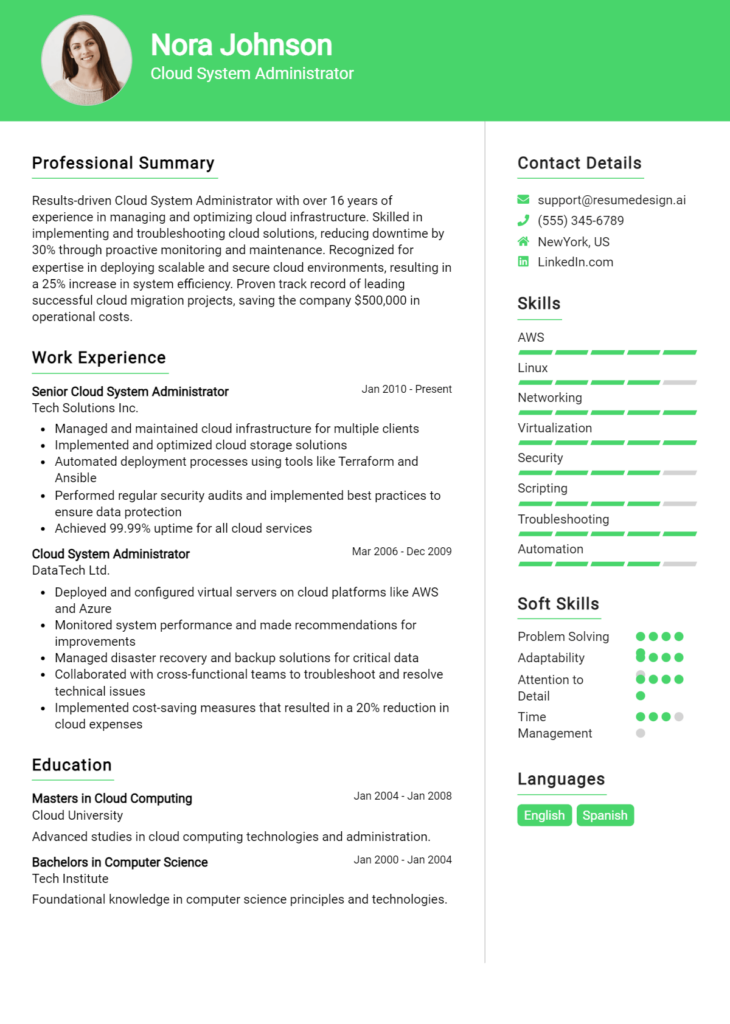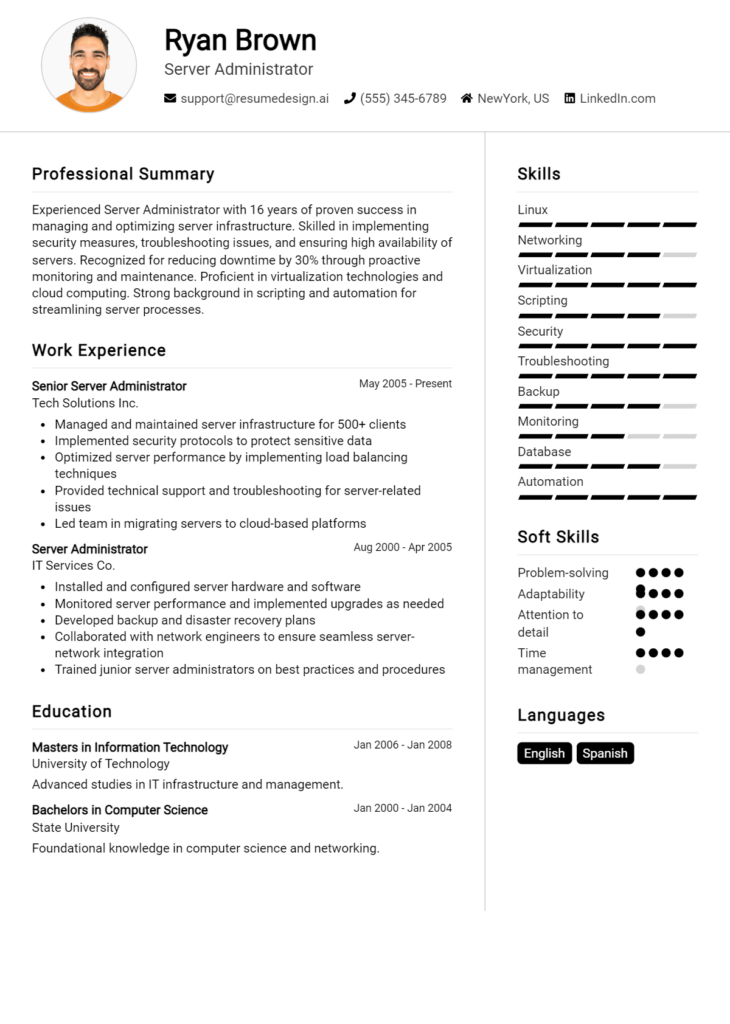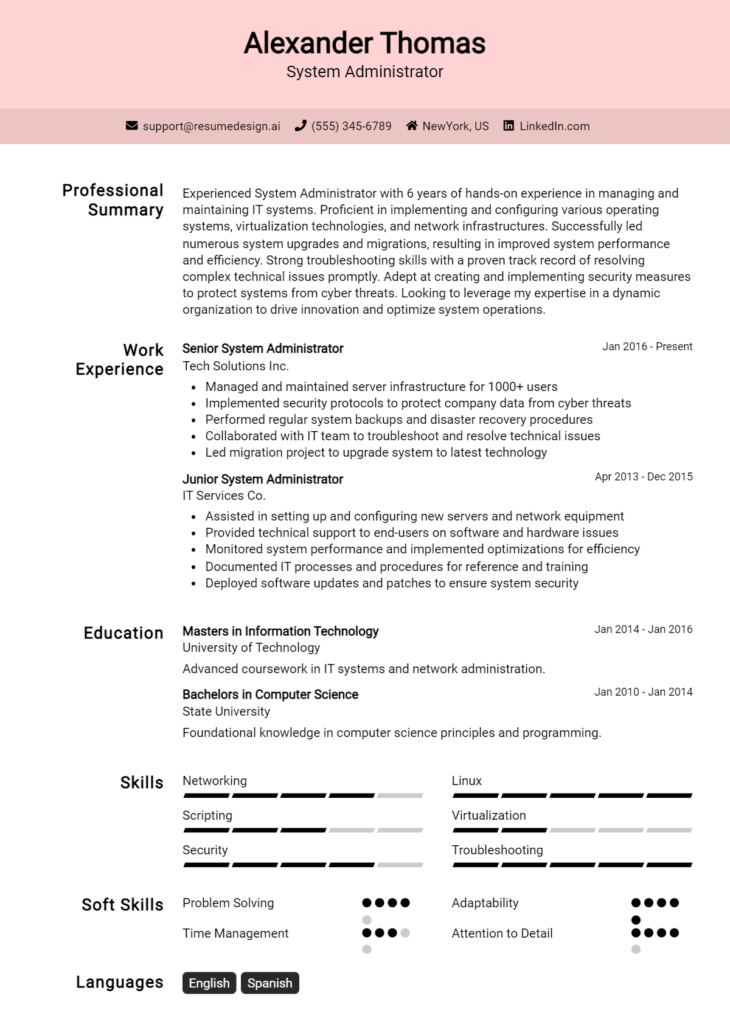Exchange Administrator Core Responsibilities
An Exchange Administrator plays a crucial role in managing an organization's email server and communication systems, requiring a blend of technical, operational, and problem-solving skills. This professional bridges various departments by ensuring seamless communication and collaboration through efficient email management, user support, and system maintenance. Their expertise contributes significantly to organizational goals by enhancing productivity and minimizing downtime. A well-structured resume showcasing these competencies can effectively highlight their value to potential employers.
Common Responsibilities Listed on Exchange Administrator Resume
- Manage and maintain Microsoft Exchange servers to ensure optimal performance.
- Implement security protocols and policies to safeguard email data.
- Monitor and troubleshoot email delivery issues and server performance.
- Assist users with email configuration and troubleshooting inquiries.
- Conduct regular backups and disaster recovery procedures for email systems.
- Configure and manage Exchange Online and hybrid environments.
- Collaborate with IT teams to integrate Exchange services with other applications.
- Perform user account management, including creation and deletion of mailboxes.
- Stay updated with the latest Exchange technologies and best practices.
- Provide training and support to end-users on email functionalities.
- Document processes and create reports for system performance analysis.
High-Level Resume Tips for Exchange Administrator Professionals
In the competitive landscape of IT, a well-crafted resume is essential for Exchange Administrator professionals seeking to make a strong first impression. As the initial touchpoint between candidates and potential employers, a resume must not only reflect the candidate's technical skills but also their achievements and contributions in previous roles. It serves as a marketing tool that emphasizes unique qualifications and experiences relevant to the Exchange Administrator position. This guide will offer practical and actionable resume tips specifically tailored for Exchange Administrator professionals, ensuring that your application stands out in a crowded job market.
Top Resume Tips for Exchange Administrator Professionals
- Tailor your resume to the specific job description by incorporating keywords and phrases that match the requirements of the position.
- Highlight relevant experience in Exchange Server management, including installation, configuration, and troubleshooting.
- Quantify your achievements by using metrics, such as the number of users supported or improvements in system uptime or performance.
- Showcase industry-specific skills, including knowledge of PowerShell scripting, Active Directory integration, and email migration strategies.
- Include certifications such as Microsoft Certified: Exchange Server or Microsoft 365 Certified to validate your expertise.
- Use a clear and professional format that enhances readability, emphasizing key sections such as skills, experience, and education.
- Incorporate a summary statement at the top of your resume that succinctly highlights your qualifications and career goals.
- Detail any experience with security measures for Exchange environments, including anti-spam, anti-virus solutions, and compliance protocols.
- List relevant projects or initiatives that demonstrate your problem-solving skills and ability to work collaboratively within a team.
By implementing these tips, Exchange Administrator professionals can significantly enhance their resumes, increasing the likelihood of attracting the attention of hiring managers and landing coveted job opportunities in the field. A targeted and well-structured resume not only showcases your qualifications but also reflects your commitment to the role, setting the stage for a successful job application journey.
Why Resume Headlines & Titles are Important for Exchange Administrator
In the competitive field of Exchange Administration, creating a strong resume headline or title is crucial. A well-crafted headline serves as the first impression for hiring managers, summarizing a candidate's key qualifications in a concise and impactful manner. It has the power to immediately grab attention, setting the tone for the rest of the resume. A strong headline should be relevant to the specific job being applied for, ensuring that it reflects the skills and experiences that align with the position. By succinctly highlighting the candidate's strengths, a compelling headline can differentiate them from the competition and encourage hiring managers to delve deeper into their qualifications.
Best Practices for Crafting Resume Headlines for Exchange Administrator
- Keep it concise: Aim for a headline that is brief yet descriptive, ideally no more than 10-15 words.
- Be role-specific: Tailor the headline to reflect the Exchange Administrator position, incorporating relevant keywords.
- Highlight key qualifications: Focus on your most significant skills, experiences, or achievements that relate to the job.
- Use action-oriented language: Choose strong verbs that convey your capabilities and impact.
- Avoid jargon: Use clear and accessible language that anyone can understand, avoiding technical terms that may not resonate with all hiring managers.
- Showcase certifications: If applicable, include relevant certifications to enhance credibility.
- Incorporate metrics: If possible, use numbers to quantify your accomplishments and demonstrate your effectiveness.
- Revise and refine: Take the time to review and edit your headline to ensure it is polished and impactful.
Example Resume Headlines for Exchange Administrator
Strong Resume Headlines
Certified Exchange Administrator with 5+ Years of Experience in Enterprise Environments
Results-Driven Exchange Specialist: Enhanced System Uptime by 30%
Expert in Exchange Server Configuration and Migration with Proven Track Record
Weak Resume Headlines
Exchange Administrator Looking for a Job
IT Professional
Strong resume headlines are effective because they clearly communicate the candidate's expertise, achievements, and relevance to the Exchange Administrator role. They use specific language that delineates the candidate's strengths and provides quantifiable evidence of their impact. In contrast, weak headlines lack clarity and specificity, failing to engage hiring managers or convey any meaningful information about the candidate's qualifications. By avoiding generic phrases, candidates can better position themselves as the ideal fit for the role.
Writing an Exceptional Exchange Administrator Resume Summary
A well-crafted resume summary is crucial for an Exchange Administrator as it serves as the first impression for hiring managers. This brief section quickly captures attention by highlighting the candidate's key skills, relevant experience, and significant accomplishments related to the role. A strong summary should be concise yet impactful, tailored specifically to the job being applied for, ensuring that it aligns with the organization's needs and expectations. By doing so, candidates increase their chances of standing out in a competitive job market.
Best Practices for Writing a Exchange Administrator Resume Summary
- Quantify achievements to provide concrete evidence of success.
- Focus on relevant skills such as Exchange Server management, troubleshooting, and migration expertise.
- Tailor the summary to reflect the specific job description and requirements.
- Use industry-specific terminology to demonstrate familiarity and expertise.
- Keep it concise, ideally between 3-5 sentences, to maintain the reader's attention.
- Highlight certifications or training related to Exchange Administration.
- Showcase problem-solving abilities and examples of how you've improved systems or processes.
- Convey a professional tone that reflects your experience level and commitment to the role.
Example Exchange Administrator Resume Summaries
Strong Resume Summaries
Results-driven Exchange Administrator with over 8 years of experience managing Exchange Server environments for organizations with up to 5,000 users. Successfully led a migration project that reduced downtime by 30% and improved email performance by 25%.
Certified Microsoft Exchange Specialist skilled in troubleshooting and optimizing Exchange environments. Achieved a 99.9% uptime rate through proactive monitoring and maintenance of email systems in a fast-paced corporate setting.
Dynamic IT professional with a proven track record of enhancing email security protocols, resulting in a 40% decrease in phishing incidents. Expert in implementing Exchange 2016 and Office 365 migrations, ensuring seamless transitions for users.
Weak Resume Summaries
Experienced Exchange Administrator looking for a challenging role in IT.
Skilled in various IT tasks, including email management and system maintenance.
The strong resume summaries are effective because they provide clear, quantifiable results and specific skills that are directly relevant to the Exchange Administrator role. They highlight achievements and demonstrate the candidate's ability to add value to the organization. In contrast, the weak summaries lack detail and specificity, failing to capture the reader’s interest or convey a sense of expertise, which diminishes their impact and effectiveness in a competitive job market.
Work Experience Section for Exchange Administrator Resume
The work experience section of an Exchange Administrator resume is crucial as it serves as a testament to the candidate’s technical skills, managerial capabilities, and commitment to delivering high-quality products. This section not only highlights the hands-on experience with Exchange systems but also emphasizes the ability to lead teams and implement effective solutions that enhance organizational efficiency. By quantifying achievements and aligning the experience with industry standards, candidates can effectively demonstrate their value to potential employers, showcasing a track record of success and expertise in the field.
Best Practices for Exchange Administrator Work Experience
- Highlight technical skills relevant to Exchange administration, such as server management, troubleshooting, and security measures.
- Quantify achievements with metrics, such as reduced downtime, increased system performance, or cost savings.
- Demonstrate your ability to collaborate with cross-functional teams, illustrating teamwork in project implementations.
- Use action verbs to describe your responsibilities and accomplishments, making the statements more impactful.
- Tailor your experiences to align with the job description, ensuring relevance to the desired role.
- Include specific technologies and tools you've worked with, such as Exchange Online, PowerShell, or Active Directory.
- Showcase any leadership roles or mentorship experiences that indicate your ability to manage and develop a team.
- Include professional development activities, such as certifications or training, that enhance your qualifications as an Exchange Administrator.
Example Work Experiences for Exchange Administrator
Strong Experiences
- Led a team of 5 in a successful migration of over 1,500 mailboxes to Exchange Online, achieving a 30% reduction in operational costs.
- Implemented a new backup strategy that decreased data loss incidents by 40%, enhancing overall data security and recovery times.
- Designed and executed a security protocol that resulted in zero security breaches over two years, ensuring compliance with industry standards.
- Collaborated with the IT department to reduce email downtime by 25% through proactive system monitoring and regular updates.
Weak Experiences
- Worked on various Exchange-related tasks without specific details on impact or results.
- Assisted in server management but did not specify the number of servers or the extent of responsibilities.
- Participated in team meetings regarding Exchange but failed to highlight any contributions or outcomes.
- Helped with troubleshooting issues but did not quantify the results or improvements made.
The examples of strong experiences are considered effective because they clearly outline specific achievements, quantify results, and demonstrate technical leadership and collaboration. In contrast, the weak experiences lack detail, measurable outcomes, and a clear indication of the candidate's contributions, making them less impactful and less likely to impress potential employers.
Education and Certifications Section for Exchange Administrator Resume
The education and certifications section of an Exchange Administrator resume serves as a critical component that showcases the candidate's academic foundation and professional qualifications. This section not only highlights the knowledge acquired through formal education but also emphasizes the importance of industry-relevant certifications and ongoing learning efforts. By providing pertinent coursework, recognized certifications, and any specialized training, candidates can significantly enhance their credibility and demonstrate their alignment with the specific requirements of the Exchange Administrator role. This comprehensive overview allows potential employers to assess the candidate's readiness and commitment to maintaining expertise in a rapidly evolving technological landscape.
Best Practices for Exchange Administrator Education and Certifications
- Prioritize relevant degrees in Computer Science, Information Technology, or related fields.
- Include industry-recognized certifications such as Microsoft Certified: Exchange Server Administrator Associate.
- Highlight any specialized training in Exchange Online or Office 365.
- Provide details of relevant coursework that directly applies to Exchange administration tasks.
- Keep the section concise but informative, avoiding unnecessary details.
- List certifications in chronological order, emphasizing the most recent ones first.
- Consider including ongoing education or training to show commitment to professional development.
- Ensure all credentials are current and relevant to the position being applied for.
Example Education and Certifications for Exchange Administrator
Strong Examples
- Bachelor of Science in Computer Science, XYZ University, 2020
- Microsoft Certified: Exchange Server Administrator Associate, 2023
- Specialized Training in Office 365 Administration, ABC Institute, 2022
- Relevant Coursework: Network Security, Database Management, and Systems Analysis
Weak Examples
- Associate Degree in Arts, Generic Community College, 2018
- Certificate in Basic Computer Skills, Online Course Provider, 2021
- Outdated Certification: Microsoft Certified Professional (MCP), 2015
- General Coursework: Introduction to Psychology and Art History
The strong examples are considered effective because they directly relate to the skills and knowledge required for an Exchange Administrator, showcasing relevant degrees, certifications, and specialized training that align with the job role. In contrast, the weak examples lack relevance to the position, either due to outdated certifications, irrelevant degrees, or coursework that does not contribute to the necessary technical expertise in Exchange administration. This distinction highlights the importance of tailoring educational qualifications to the specific demands of the role.
Top Skills & Keywords for Exchange Administrator Resume
As an Exchange Administrator, possessing the right skills is crucial for ensuring the seamless operation of email systems and collaboration tools within an organization. A well-crafted resume that highlights both soft and hard skills can significantly enhance your candidacy by demonstrating your technical expertise and ability to work effectively within a team. Employers look for candidates who not only have the necessary technical know-how but also possess interpersonal skills that facilitate smooth communication and collaboration. By focusing on these essential skills, you can create a compelling resume that showcases your qualifications and aligns with the expectations of potential employers.
Top Hard & Soft Skills for Exchange Administrator
Soft Skills
- Effective Communication
- Problem Solving
- Team Collaboration
- Time Management
- Adaptability
- Attention to Detail
- Customer Service Orientation
- Critical Thinking
- Conflict Resolution
- Leadership
Hard Skills
- Microsoft Exchange Server Management
- Active Directory Administration
- PowerShell Scripting
- Email Migration and Deployment
- Security Protocols and Compliance
- Backup and Recovery Solutions
- Troubleshooting and Technical Support
- Knowledge of SMTP, IMAP, and POP3
- Integration with Office 365
- Performance Monitoring and Reporting
By incorporating these skills into your resume and providing detailed examples in your work experience, you can significantly increase your chances of standing out in the competitive job market for Exchange Administrators.
Stand Out with a Winning Exchange Administrator Cover Letter
As a dedicated IT professional with extensive experience in managing and optimizing Microsoft Exchange environments, I am excited to apply for the Exchange Administrator position at [Company Name]. With a proven track record in enhancing email performance, ensuring system security, and delivering seamless user experiences, I am confident in my ability to contribute to your team and support your organization’s communication infrastructure.
In my previous role at [Previous Company Name], I successfully managed a complex Exchange 2016 environment that supported over 1,000 users. My responsibilities included performing regular maintenance, troubleshooting issues, and implementing best practices for email security. I played a pivotal role in migrating our organization from an on-premises Exchange setup to a hybrid solution, which improved efficiency and reduced operational costs. My strong analytical skills and attention to detail enabled me to identify potential issues before they escalated, ensuring maximum uptime and reliability for our users.
Collaboration and communication are key components of any successful IT operation, and I pride myself on my ability to work closely with cross-functional teams to achieve common goals. I have experience in training end-users on best practices and new features, which has not only improved user satisfaction but also minimized the number of support tickets generated. I am well-versed in PowerShell scripting, which I have used effectively to automate routine tasks and streamline processes, ultimately saving time and resources.
I am enthusiastic about the opportunity to bring my expertise in Exchange administration to [Company Name]. I am particularly impressed by [specific aspect of the company or its projects], and I am eager to support your mission by ensuring a robust and efficient email environment. Thank you for considering my application. I look forward to the possibility of discussing how my skills and experiences align with your needs in more detail.
Common Mistakes to Avoid in a Exchange Administrator Resume
When crafting a resume for an Exchange Administrator position, it's crucial to present your skills and experience in a clear and effective manner. However, many candidates make several common mistakes that can hinder their chances of landing an interview. By avoiding these pitfalls, you can create a more compelling resume that showcases your qualifications and expertise in Exchange administration.
Neglecting Relevant Certifications: Failing to highlight certifications such as Microsoft Certified: Exchange Administrator Associate can make you appear less qualified. Ensure you list any relevant certifications prominently.
Using Generic Job Descriptions: Merely listing duties without tailoring them to the specific role can dilute your experience. Customize your descriptions to reflect your accomplishments and the skills that are directly applicable to Exchange administration.
Overloading with Technical Jargon: While technical skills are essential, excessive jargon can confuse hiring managers. Aim for a balance between technical terminology and clear, understandable language.
Ignoring Soft Skills: Exchange Administrators often need strong communication and problem-solving skills. Not mentioning these can lead to an incomplete picture of your capabilities.
Omitting Key Achievements: Just listing responsibilities without showcasing your achievements fails to demonstrate your impact. Include metrics or specific accomplishments that highlight your contributions.
Formatting Issues: A cluttered or poorly formatted resume can distract from your qualifications. Use clear headings, bullet points, and consistent font styles for better readability.
Failing to Tailor Your Resume: Sending out a generic resume instead of one tailored to the specific job description can result in missed opportunities. Make sure to align your experience with the requirements of the position.
Listing Unrelated Experience: Including work experiences that are not relevant to Exchange administration can dilute the focus of your resume. Stick to roles that showcase your relevant skills and experiences in the field.
Conclusion
As an Exchange Administrator, you play a crucial role in managing and maintaining the organization’s email systems, ensuring seamless communication and data integrity. Key responsibilities typically include configuring and troubleshooting Microsoft Exchange servers, managing user accounts, implementing security measures, and performing regular backups. Staying updated on the latest best practices and technologies is essential for optimizing system performance and enhancing user experience.
Given the technical nature of the role, it is vital to highlight specific skills and achievements on your resume that demonstrate your expertise. Focus on showcasing your experience with Exchange Online, PowerShell scripting, and any certifications that validate your knowledge, such as Microsoft 365 Certified: Messaging Administrator Associate.
As you reflect on your career as an Exchange Administrator, consider reviewing and updating your resume to effectively convey your qualifications to potential employers. Make sure your resume stands out by utilizing available resources such as resume templates, a resume builder, and resume examples. Additionally, enhance your application with professional cover letter templates. Take action today to ensure your resume aligns with your professional experience and aspirations!

